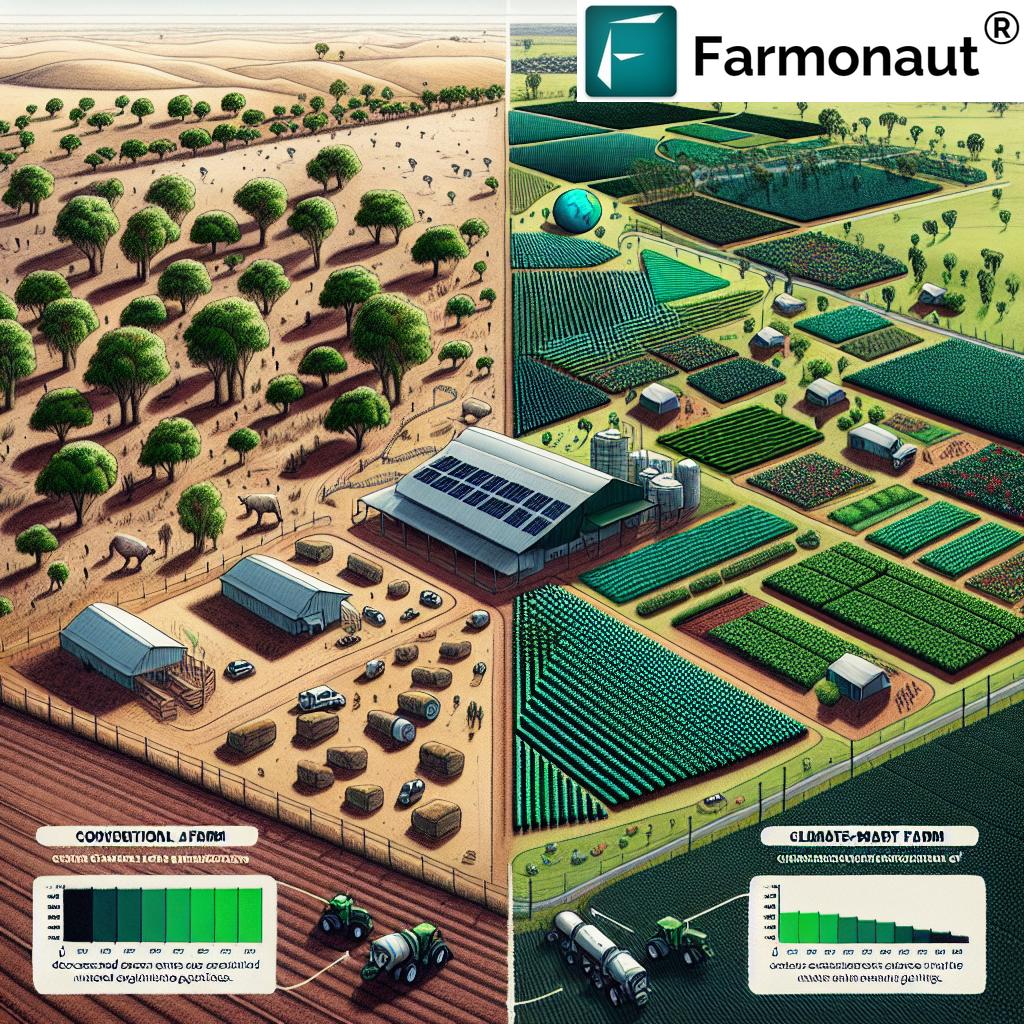Discover Affordable Grain Storage Solutions: Queensland’s Massive Silo Sale on Farmonaut
“Queensland’s silo sale offers storage solutions with capacities ranging from 25 to 80 tonnes, catering to diverse agricultural needs.”
Welcome to an exciting opportunity in the world of agricultural equipment and grain storage solutions! We’re thrilled to bring you news of a remarkable sale happening right here in Queensland. If you’re a farmer, agricultural entrepreneur, or anyone involved in the business of crop storage, this blog post is tailor-made for you.
In this comprehensive guide, we’ll explore the details of a unique farm machinery listing that’s making waves in the agricultural equipment marketplace. We’re talking about three large silos and one small hopper that are up for grabs, offering impressive crop storage capacity for various agricultural needs.

But before we dive into the specifics, let’s take a moment to understand why this sale is so significant for the agricultural community.
The Importance of Grain Storage in Modern Agriculture
In today’s fast-paced agricultural world, efficient grain storage is more crucial than ever. Proper storage facilities not only protect your harvest from pests and weather conditions but also allow you to capitalize on market fluctuations. With the right silos, you can:
- Maintain grain quality for extended periods
- Reduce post-harvest losses
- Improve your farm’s operational efficiency
- Enhance your ability to sell when prices are most favorable
That’s why we’re excited to introduce you to this exceptional opportunity to upgrade your farm’s infrastructure with high-quality, used agricultural equipment.
The Silo Sale: A Closer Look
Now, let’s get into the meat of this farm equipment listing. We’re looking at a collection of silos that were originally used for cement and sand storage. Don’t let their original purpose fool you – these structures are perfectly adaptable for various agricultural uses, including grain, fodder, and other agricultural inputs storage.
Here’s what’s on offer:
- Three large silos with capacities ranging from 60 to 80 tonnes
- One small hopper with a capacity of approximately 25 tonnes
- Features include air slides and augers for efficient material handling
These silos represent a cost-effective solution for farmers looking to expand their storage capabilities without breaking the bank.
Farmonaut’s Role in Assessing Silo Condition
At Farmonaut, we’re committed to leveraging technology to benefit the agricultural community. While we’re not directly involved in the sale of these silos, our remote sensing technology can play a crucial role in helping potential buyers assess the condition and potential of these structures.
Here’s how Farmonaut’s technology can assist:
- Provide high-resolution imagery of the silos and surrounding area
- Offer insights into the local climate and environmental conditions that might affect silo performance
- Help in planning optimal placement of silos on your property
To explore how Farmonaut can support your agricultural operations, check out our web app or download our mobile apps:
Detailed Silo Specifications
Let’s break down the specifications of each silo to give you a clearer picture of what’s available:
| Silo Type | Original Use | Capacity (tonnes) | Key Features | Installation Date | Condition | Potential Agricultural Uses | Estimated Price Range |
|---|---|---|---|---|---|---|---|
| Large Silo 1 | Cement | 80 | Air slides, Auger | 2010 | Good | Grain, Fodder | $15,000 – $20,000 |
| Large Silo 2 | Sand | 70 | Air slides | 2012 | Very Good | Grain, Seeds | $14,000 – $18,000 |
| Large Silo 3 | Cement | 60 | Auger | 2011 | Good | Grain, Fertilizer | $12,000 – $16,000 |
| Small Hopper | Sand | 25 | Conical bottom | 2015 | Excellent | Small grain batches, Feed | $5,000 – $7,000 |
“The sale includes three large silos and one small hopper, originally used for cement and sand storage in Queensland.”
Adapting Industrial Silos for Agricultural Use
You might be wondering how silos originally used for cement and sand can be repurposed for agricultural use. It’s a valid question, and we’re here to address it. The truth is, with proper cleaning and some modifications, these silos can be excellent for storing various agricultural products.
Here are some key points to consider:
- Thorough Cleaning: Industrial-grade cleaning can remove all traces of previous contents, making the silos safe for grain storage.
- Modification of Discharge Systems: The existing air slides and augers can be adapted or replaced to suit grain handling needs.
- Ventilation Upgrades: Additional ventilation may be added to ensure proper air circulation for grain storage.
- Moisture Control: Implementing moisture barriers or control systems can protect stored grains from humidity.
These adaptations can transform industrial silos into efficient and cost-effective grain storage solutions for your farm.
Benefits of Investing in Used Silos
Opting for used silos in this farm equipment sale can offer numerous advantages:
- Cost-Effectiveness: Used silos are significantly more affordable than new ones, allowing you to expand storage capacity without a hefty investment.
- Immediate Availability: Unlike new silos that might have long lead times, these used silos are ready for immediate purchase and installation.
- Proven Durability: These silos have already withstood years of industrial use, demonstrating their robustness and longevity.
- Customization Potential: Used silos can be modified to suit your specific needs, often more easily than new, standardized models.
Potential Uses for Your New Silos
The versatility of these silos opens up a world of possibilities for your agricultural operations. Here are some potential uses you might consider:
- Grain Storage: Perfect for storing wheat, corn, barley, and other grains.
- Seed Storage: Ideal for keeping seeds in optimal condition before planting season.
- Fertilizer Storage: Protect your fertilizer from moisture and contamination.
- Animal Feed Storage: Keep livestock feed fresh and easily accessible.
- Temporary Crop Holding: Use as a buffer storage during peak harvest times.
The small hopper, in particular, can be an excellent addition for tasks requiring smaller batch storage or as a transfer point in your grain handling system.
Integrating New Silos into Your Existing Farm Setup
Adding new silos to your farm requires careful planning. Here are some tips to ensure a smooth integration:
- Site Preparation: Ensure you have a sturdy, level foundation for your silos.
- Accessibility: Plan for easy access for loading and unloading equipment.
- Connectivity: Consider how the new silos will connect with your existing grain handling systems.
- Safety Measures: Implement necessary safety features, including proper ladders, platforms, and fall protection.
- Pest Control: Develop a strategy to keep stored grains safe from pests and rodents.
Remember, proper integration can significantly enhance your farm’s efficiency and productivity.

Maintenance Tips for Your New Silos
To ensure the longevity and efficiency of your newly acquired silos, regular maintenance is crucial. Here are some key maintenance tips:
- Regular Inspections: Check for signs of wear, rust, or damage periodically.
- Cleaning: Thoroughly clean the silos between uses, especially when switching stored materials.
- Moisture Control: Regularly check and maintain seals to prevent moisture ingress.
- Lubrication: Keep moving parts, like augers, well-lubricated for smooth operation.
- Pest Management: Implement and maintain a robust pest control program.
By following these maintenance practices, you can extend the life of your silos and ensure they continue to serve your farm effectively for years to come.
How Farmonaut Can Enhance Your Silo Management
While Farmonaut isn’t directly involved in silo sales or manufacturing, our advanced agricultural technology can significantly enhance your silo management practices. Here’s how:
- Crop Health Monitoring: Our satellite-based crop health monitoring can help you predict yields and plan your storage needs accordingly.
- Weather Forecasting: Use our precise weather forecasts to make informed decisions about when to move crops in or out of storage.
- Resource Management: Our platform can help you optimize the use of your silos as part of your overall farm resource management strategy.
To explore how Farmonaut can support your farming operations, check out our web app.
Financial Considerations When Purchasing Used Silos
Investing in used silos can be a smart financial move, but it’s important to consider all aspects of the purchase. Here are some financial factors to keep in mind:
- Initial Cost vs. New Silos: Compare the cost of these used silos against new ones of similar capacity.
- Installation Expenses: Factor in the cost of transporting and installing the silos on your property.
- Potential Repairs: Budget for any immediate repairs or modifications needed.
- Long-term Maintenance: Consider the ongoing maintenance costs over the expected lifespan of the silos.
- Tax Implications: Consult with a tax professional about potential deductions for farm equipment purchases.
- Financing Options: Explore loans or financing options specifically designed for agricultural equipment purchases.
Remember, while the upfront cost of used silos is lower, it’s crucial to consider the total cost of ownership over time.
Environmental Impact of Repurposing Silos
In today’s environmentally conscious world, the decision to repurpose existing silos rather than manufacturing new ones carries significant environmental benefits:
- Reduced Carbon Footprint: Repurposing existing structures avoids the carbon emissions associated with manufacturing new silos.
- Resource Conservation: By giving these silos a second life, we’re conserving the raw materials and energy that would be required for new construction.
- Waste Reduction: Repurposing prevents these large structures from potentially ending up in landfills.
- Land Use Efficiency: Utilizing existing silos can reduce the need for additional construction, preserving farmland.
By choosing to invest in these repurposed silos, you’re not just making a smart business decision; you’re also contributing to more sustainable agricultural practices.
The Future of Grain Storage: Trends and Innovations
While these used silos offer an excellent immediate solution for your storage needs, it’s worth looking at the future of grain storage. Here are some trends and innovations shaping the industry:
- Smart Silos: Integration of IoT sensors for real-time monitoring of grain conditions.
- Automated Aeration Systems: Advanced systems that automatically adjust aeration based on weather conditions and grain moisture levels.
- Modular Designs: Flexible, scalable silo systems that can grow with your farm’s needs.
- Sustainable Materials: Development of eco-friendly materials for silo construction.
- Advanced Pest Control: Innovative methods for preventing pest infestations without chemical use.
While these used silos may not have all these advanced features, many can be retrofitted with smart monitoring systems to bring them into the digital age of farming.
Safety Considerations for Silo Operation
Safety should always be a top priority when operating grain storage facilities. Here are some crucial safety considerations:
- Proper Training: Ensure all personnel are trained in safe silo operation and grain handling procedures.
- Regular Inspections: Conduct routine safety checks of all silo components, including ladders, platforms, and confined spaces.
- Personal Protective Equipment (PPE): Provide and enforce the use of appropriate PPE for workers.
- Ventilation: Implement proper ventilation systems to prevent the buildup of harmful gases.
- Emergency Procedures: Develop and regularly practice emergency response procedures.
- Grain Entrapment Prevention: Install safety devices and follow proper procedures to prevent grain entrapment incidents.
Remember, a safe working environment is crucial for the success and sustainability of your agricultural operations.
Legal and Regulatory Compliance
When purchasing and operating grain storage facilities, it’s important to be aware of and comply with relevant legal and regulatory requirements. Consider the following:
- Local Zoning Laws: Ensure that the installation of silos complies with local zoning regulations.
- Building Permits: Obtain necessary permits for silo installation and any modifications.
- Food Safety Regulations: If storing grains for human consumption, be aware of food safety standards and regulations.
- Environmental Regulations: Comply with environmental laws regarding dust control, runoff, and other potential impacts.
- Occupational Health and Safety: Adhere to workplace safety regulations to protect workers and visitors.
Consulting with local authorities and perhaps a legal advisor can help ensure you’re fully compliant with all relevant regulations.
Maximizing ROI on Your Silo Investment
To get the most out of your investment in these used silos, consider these strategies for maximizing your return on investment (ROI):
- Optimal Capacity Utilization: Plan your crop storage to make full use of the silo capacity throughout the year.
- Market Timing: Use the additional storage capacity to hold crops until market prices are most favorable.
- Diversification: Consider using the silos for various crops or even renting out excess capacity to neighboring farms.
- Quality Preservation: Implement best practices in grain storage to maintain crop quality, potentially commanding higher prices.
- Efficiency Improvements: Integrate the new silos into your existing operations to streamline your overall grain handling process.
By strategically using your new storage capabilities, you can significantly enhance the profitability of your farming operations.
Conclusion: Seizing the Opportunity
The sale of these used silos in Queensland represents a unique opportunity for farmers and agricultural businesses to expand their storage capabilities cost-effectively. By repurposing these industrial silos for agricultural use, you’re not only making a smart financial decision but also contributing to sustainable farming practices.
Remember, while Farmonaut is not directly involved in the sale or manufacturing of these silos, our advanced agricultural technology can complement your investment by helping you manage your crops and resources more effectively. From satellite-based crop monitoring to weather forecasting and resource management, Farmonaut’s tools can enhance your overall farm productivity.
We encourage you to carefully consider this opportunity and how it might benefit your agricultural operations. Don’t miss out on this chance to upgrade your farm’s infrastructure and potentially boost your profitability.
For more information on how Farmonaut can support your farming operations, visit our web app or explore our API capabilities at Farmonaut API. For developers interested in integrating our technology, check out our API Developer Docs.
FAQs
- Q: Can these silos be used for storing different types of grains?
A: Yes, with proper cleaning and modifications, these silos can be adapted to store various types of grains, seeds, and other agricultural inputs. - Q: What is the expected lifespan of these used silos?
A: With proper maintenance, these repurposed silos can last for many years, potentially 20-30 years or more, depending on usage and environmental conditions. - Q: Are there any special requirements for transporting these silos?
A: Transportation of large silos typically requires specialized equipment and permits. It’s best to consult with a professional transportation service experienced in moving agricultural equipment. - Q: Can Farmonaut’s technology be used to monitor grain storage in these silos?
A: While Farmonaut’s primary focus is on satellite-based crop monitoring and weather forecasting, our technology can indirectly assist in planning storage needs and optimizing resource management, including silo usage. - Q: Is financing available for purchasing these silos?
A: Financing options are typically available for agricultural equipment purchases. We recommend consulting with agricultural lenders or your local bank for specific financing options.















